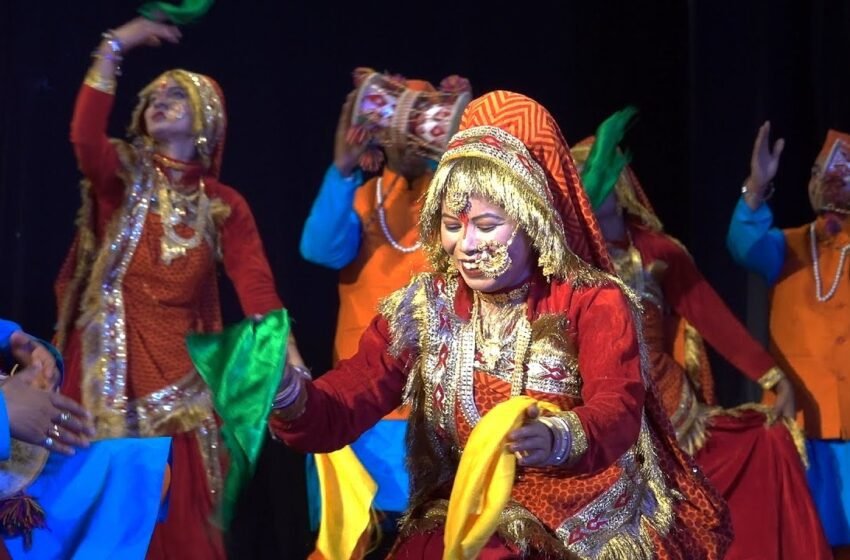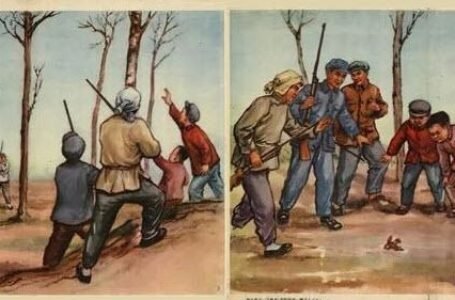Chapeli: The Dying Echoes of Uttarakhand’s Folk Legacy

Uttarakhand, nestled in the lap of the Himalayas, is a land rich in culture, traditions, and folklore. Among its many musical treasures, Chapeli stands out as an essential part of its folk heritage. Chapeli, a form of traditional folk singing, has been an integral part of festivals and social gatherings in Uttarakhand for generations. These melodious tunes, often accompanied by dance, celebrate the joys of mountain life, expressing emotions ranging from love and devotion to humor and everyday struggles. However, with changing times and the influences of modernity, Chapeli is slowly fading into oblivion, raising concerns about the loss of an important cultural tradition.
The Essence of Chapeli: Music of the Mountains
Chapeli is a genre of folk music that thrives in the vibrant cultural landscape of Uttarakhand. It is predominantly performed during festivals, fairs, and weddings, creating an atmosphere of joy and unity among the people. Sung in a call-and-response manner, Chapeli typically involves a male and female singer who engage in a playful musical exchange, often laced with wit and humor. The lyrics, deeply rooted in the daily lives of mountain dwellers, narrate tales of love, the beauty of nature, and the hardships faced in the rugged terrain.
The rhythm of Chapeli is simple yet enchanting, with traditional instruments such as the dhol, damau, and ransingha providing the beats. These instruments, unique to Uttarakhand’s folk music, add a rustic charm to the performances, making them lively and engaging. The dance that accompanies Chapeli is equally captivating, with men and women forming circles and moving rhythmically to the beats, creating an experience that is both visually and aurally delightful.
The Cultural and Social Significance of Chapeli
Chapeli is not just a form of entertainment; it is a reflection of the socio-cultural fabric of Uttarakhand. It serves as a medium of storytelling, preserving the oral history of the region. Through its lyrics, one can glimpse the traditions, beliefs, and lifestyle of the people living in the hills. Songs about the changing seasons, farming, festivals, and romance offer insights into their everyday experiences.
In earlier times, when electronic entertainment was nonexistent, Chapeli played a crucial role in bringing communities together. It fostered a sense of belonging and strengthened social bonds. Villagers would eagerly anticipate festive occasions where they could sing, dance, and celebrate life in harmony. It was also a way for young men and women to express their emotions and build relationships in a society where direct interactions were often limited.
The Decline of Chapeli: A Struggle for Survival
Despite its rich heritage, Chapeli is gradually disappearing from the cultural landscape of Uttarakhand. Several factors contribute to this decline, the most significant being urbanization and migration. As younger generations move to cities in search of better opportunities, they become disconnected from their roots, leading to a decline in interest and participation in traditional folk music. The influence of modern music and entertainment mediums such as Bollywood, Western music, and digital streaming platforms has further overshadowed traditional art forms.
Another major factor affecting the survival of Chapeli is the dwindling number of practitioners. With older generations passing away and fewer young people taking up the tradition, the transmission of knowledge is weakening. Unlike in the past, when folk music was an essential part of social life, today’s youth often view it as outdated or irrelevant in the modern world.
The lack of institutional support and documentation also contributes to the decline of Chapeli. Unlike other folk traditions that have been promoted and preserved through cultural initiatives, Chapeli remains largely undocumented. There is little effort to incorporate it into mainstream media or educational curricula, making it difficult for the tradition to sustain itself.
Efforts to Revive Chapeli and Preserve Uttarakhand’s Folk Heritage
Recognizing the need to preserve Chapeli, various cultural organizations and artists have taken steps to revive this dying art form. Folk musicians and cultural enthusiasts are working towards promoting Chapeli through performances at festivals, cultural programs, and social media. Documenting and archiving traditional Chapeli songs can also play a crucial role in ensuring their survival for future generations.
Educational institutions in Uttarakhand have a vital role to play in the revival of Chapeli. Introducing folk music as part of school curriculums can encourage young students to appreciate and participate in their cultural heritage. Workshops, competitions, and folk music festivals can further generate interest among the youth.
Government and tourism initiatives can also aid in preserving Chapeli. Organizing folk festivals and promoting cultural tourism in Uttarakhand can help create a platform for folk artists to showcase their talent. Recording and broadcasting Chapeli performances through regional television channels, radio stations, and digital platforms can also give it a wider reach.
Chapeli is a duet-style folk song, performed in a question-and-answer format between a man and a woman. The lyrics are poetic and often flirtatious, celebrating love, nature, and rural life. These songs are accompanied by energetic dance movements, with men and women forming a circle and responding to each other’s verses with joy and enthusiasm. The rhythm, usually supported by instruments like the dhol and damau, creates an uplifting atmosphere that reflects the carefree spirit of the mountains.
Himalayan stream or a blossoming rhododendron, symbolizing the deep admiration the locals have for their surroundings. This celebration of nature reflects the mountain people’s joy in living amidst such scenic landscapes.
Chapeli: The Folk Song of Uttarakhand and Its Reflection of Mountain Life’s Simple Joys
Folk music is the heartbeat of a culture, narrating stories of its people, traditions, and everyday life. In Uttarakhand, one such enchanting form of folk music is Chapeli, a genre that captures the essence of the region’s natural beauty, cultural richness, and simple joys. Traditionally sung during festivals and social gatherings, Chapeli is a vibrant expression of the happiness and emotions of mountain life. However, with modernization and changing lifestyles, this melodious tradition is fading, making it important to revisit and appreciate its significance.
The Essence of Chapeli
Chapeli is a duet-style folk song, performed in a question-and-answer format between a man and a woman. The lyrics are poetic and often flirtatious, celebrating love, nature, and rural life. These songs are accompanied by energetic dance movements, with men and women forming a circle and responding to each other’s verses with joy and enthusiasm. The rhythm, usually supported by instruments like the dhol and damau, creates an uplifting atmosphere that reflects the carefree spirit of the mountains.
How Chapeli Reflects the Simple Joys of Mountain Life?
Celebration of Nature
Life in Uttarakhand is deeply intertwined with nature, and Chapeli captures this connection beautifully. The lyrics often describe blooming flowers, flowing rivers, snow-capped peaks, and lush green valleys. For instance, a typical Chapeli song may compare a woman’s beauty to a Himalayan stream or a blossoming rhododendron, symbolizing the deep admiration the locals have for their surroundings. This celebration of nature reflects the mountain people’s joy in living amidst such scenic landscapes.
Love and Courtship in Rural Life
Chapeli is often playful and romantic, depicting love stories in the simplest yet most heartfelt ways. In villages where life moves at a relaxed pace, love blossoms through shared moments in fields, by rivers, or during village fairs. The songs reflect these innocent exchanges, where a boy might sing about a girl’s enchanting smile, and she might reply with a teasing remark. This lighthearted banter mirrors the simplicity and purity of mountain relationships, where love is less about materialism and more about genuine emotions.
Community Bonding and Togetherness
One of the most significant aspects of Chapeli is the sense of unity it fosters. Villages in Uttarakhand have strong community ties, and festivals provide an opportunity for people to gather, sing, and dance together. Through Chapeli, men and women engage in friendly musical dialogue, creating an environment of joy and laughter. These gatherings strengthen social bonds, remind people of their shared heritage, and provide a break from daily labor-intensive tasks.
Connection to Agricultural Life
Agriculture is the backbone of Uttarakhand’s economy, and Chapeli often references farming activities, changing seasons, and harvest celebrations. Farmers sing these songs while working in the fields, making labor feel lighter and enjoyable. For example, a Chapeli song might describe the happiness of a farmer returning home after a successful harvest, greeted by his wife and children. This simple yet profound joy reflects the satisfaction derived from hard work and self-sufficiency.
Cultural Identity and Tradition
Chapeli is more than just a song; it is an oral tradition passed down through generations. It preserves the dialects, stories, and wisdom of the elders, ensuring that the cultural identity of Uttarakhand remains alive. In a world where modern entertainment is taking over, Chapeli stands as a reminder of the traditional joys that once defined mountain life.
The Decline of Chapeli and the Need for Revival
Despite its cultural significance, Chapeli is becoming rare in modern times. With urban migration, changing lifestyles, and the influence of Bollywood and Western music, younger generations are less connected to their folk traditions. Festivals that once echoed with the melodies of Chapeli are now filled with recorded music, and fewer people know the lyrics and dance forms. However, there is hope. Many cultural organizations and folk artists are working towards reviving this beautiful tradition by organizing folk festivals, conducting workshops, and integrating Chapeli into school curriculums. If given the right platform, Chapeli can once again become a cherished part of Uttarakhand’s identity, reminding people of the beauty in simplicity.
Chapeli is not just a song; it is a reflection of the heart and soul of Uttarakhand’s mountain life. Through its celebration of nature, love, community, and traditions, it encapsulates the joys that come from living in harmony with the environment and each other. In an era where modern entertainment is rapidly taking over traditional art forms, preserving Chapeli is essential. It reminds us that happiness is not always found in material possessions but in the simple pleasures of life—singing, dancing, and celebrating together.
Keeping the Spirit of Chapeli Alive
Chapeli is not just a form of music; it is a legacy that carries the soul of Uttarakhand’s culture. While modernization has led to its decline, efforts can still be made to revive and sustain this beautiful folk tradition. Through active participation, awareness, and institutional support, Chapeli can once again become an integral part of Uttarakhand’s cultural identity. If preserved and nurtured, these songs will continue to echo in the mountains, reminding future generations of their rich and vibrant heritage.


